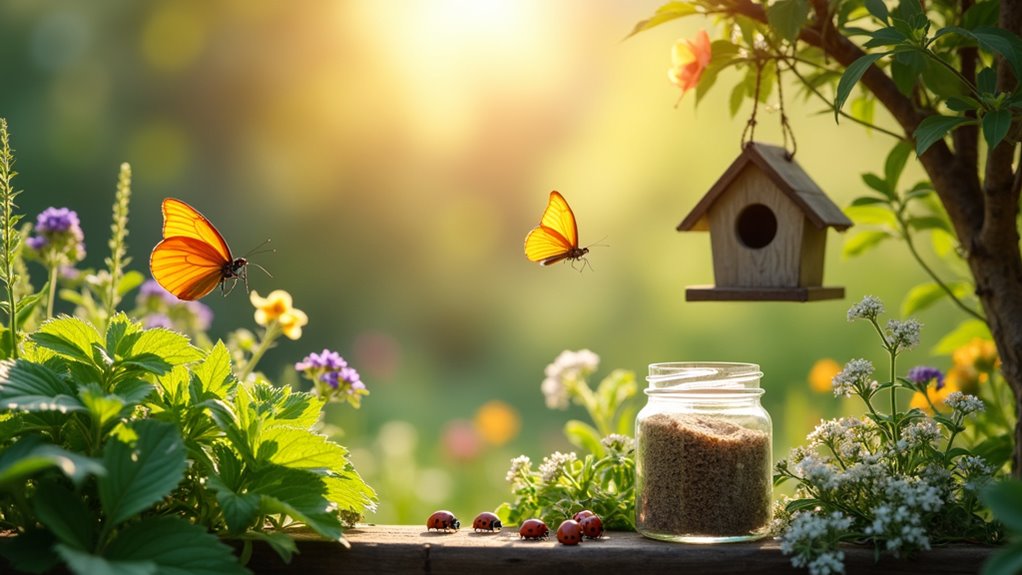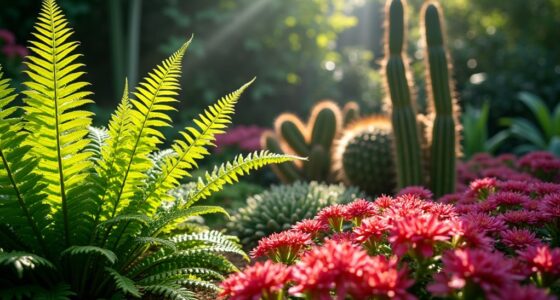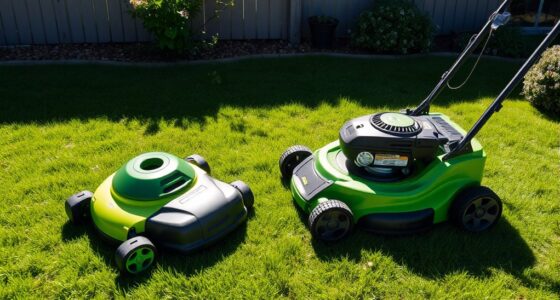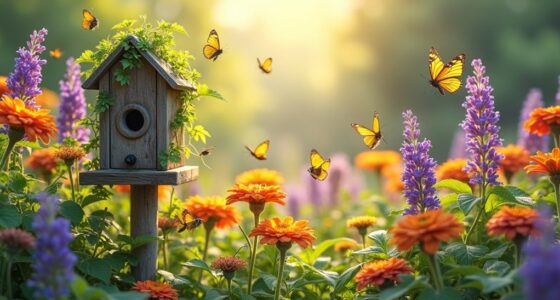To control pests naturally in your garden, start by identifying common culprits like aphids and slugs. Use manual removal techniques, such as handpicking or traps like beer for slugs. Attract beneficial insects by planting nectar-rich flowers and creating habitats for them. Implement natural remedies like garlic spray or neem oil for pest management. Consider companion planting to enhance biodiversity and deter pests. There’s plenty more you can explore to keep your garden healthy and thriving!
Key Takeaways
- Implement manual pest control techniques like handpicking pests and setting up beer traps for slugs to minimize infestations.
- Plant nectar-rich flowers to attract beneficial insects like ladybugs and lacewings, which naturally control pest populations.
- Use natural remedies like soap spray, garlic spray, and neem oil to deter pests without harsh chemicals.
- Practice companion planting to enhance biodiversity, repel unwanted pests, and support healthy plant growth.
- Create habitats for beneficial insects by incorporating birdhouses and diverse plant species to foster a balanced ecosystem.
Understanding Common Garden Pests
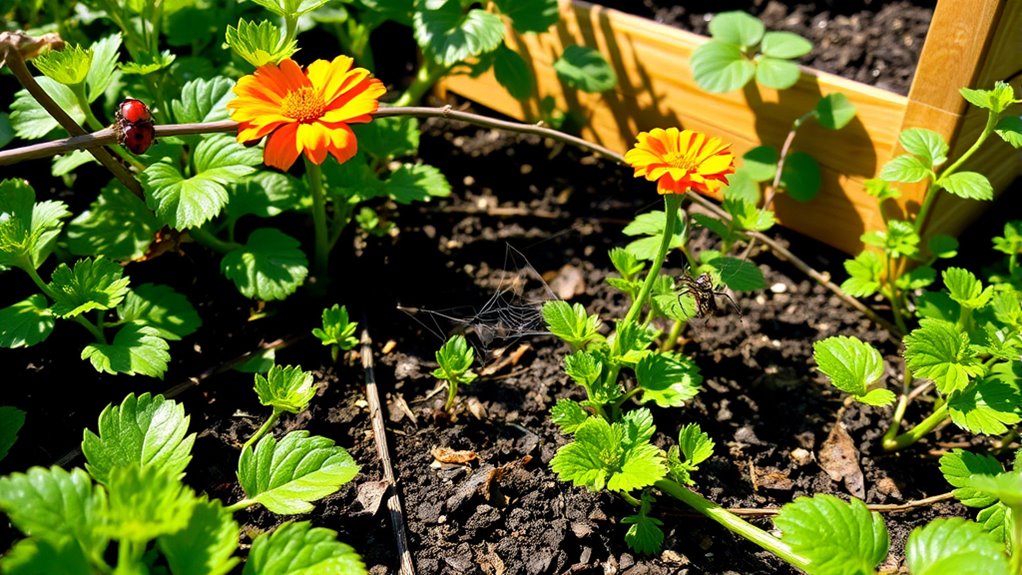
When you’re tending to your garden, it’s essential to recognize the common pests that can threaten your plants.
Aphids, small and soft-bodied, suck sap, leading to stunted growth and yellowing leaves. They can also attract other pests, creating a compounding pest problem. Additionally, these pests can be countered by beneficial insects that naturally manage their populations. Understanding the concept of soulmates can help gardeners appreciate the intricate relationships in nature, including those between plants and their pest predators.
Aphids are small pests that feed on plant sap, causing stunted growth and yellowing leaves.
Slugs and snails can devour your plants in days if you don’t control them.
Caterpillars munch through foliage, causing significant damage, especially in vegetable gardens.
Leaf miners burrow into leaves, disrupting photosynthesis and weakening your plants.
Whiteflies, tiny flying insects, feed on sap and produce honeydew, attracting other pests like ants and promoting sooty mold.
In organic gardening, understanding these pests is fundamental for effective natural methods. Regular grooming reduces shedding and helps maintain a healthy ecosystem in your garden, as it encourages the presence of beneficial insects to combat these pest problems, keeping your garden healthy and thriving.
Manual Pest Removal Techniques
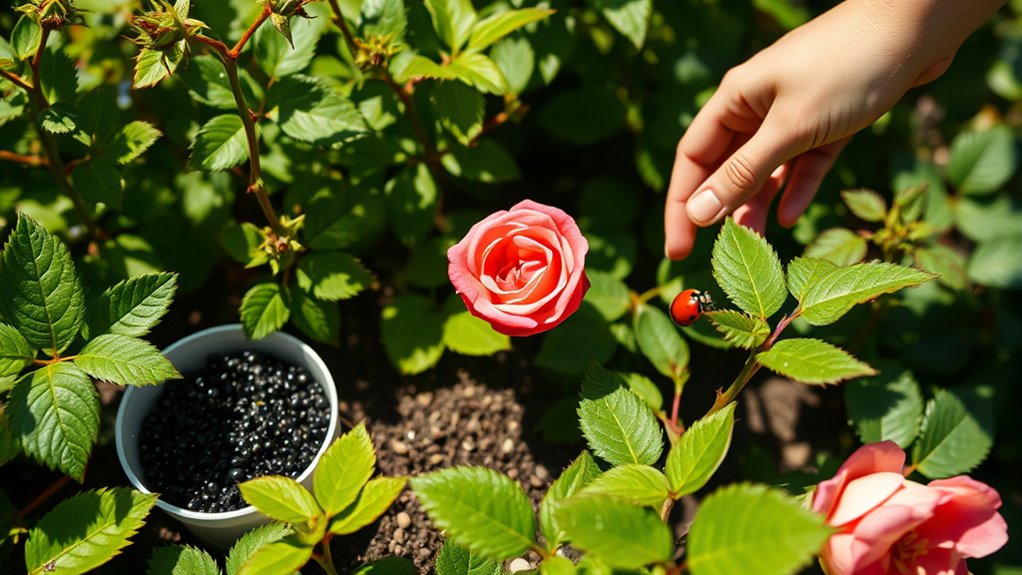
When it comes to managing pests, manual removal techniques can be incredibly effective. You can start by conducting nighttime light searches to spot unwanted insects, handpicking and relocating them as needed. Additionally, setting up beer traps can help you tackle slugs and similar pests with minimal effort. It’s also beneficial to monitor for aggressive behaviors among your plants, as some may attract pests if not properly managed. Furthermore, employing natural pest control methods can enhance your garden’s resilience against infestations. Implementing these methods not only aids in pest management but also promotes mindful consumption of resources, aligning your gardening practices with sustainable living. Utilizing non-perishable items in your compost can also attract beneficial organisms that help keep pest populations under control.
Nighttime Light Searches
While many pests hide during the day, nighttime light searches can reveal an abundance of garden invaders that become active after dark.
With a flashlight in hand, you can easily spot slugs and other nocturnal pests as they feed on your plants. Using techniques from aquatic exercises, you can develop a systematic approach to pest removal, ensuring you cover all areas of your garden. Additionally, understanding butter’s composition can help you appreciate the importance of maintaining a healthy garden environment that supports beneficial organisms. Incorporating cozy textiles into your garden setup, such as using natural materials, can help create a more inviting space for both you and beneficial insects.
Conducting regular nighttime inspections not only helps you identify hidden infestations but also allows for effective removal during cooler temperatures.
This hands-on approach minimizes the need for chemical treatments, promoting the overall health of your garden ecosystem.
By understanding pest behavior through these nighttime observations, you’ll be better equipped to manage populations proactively. Additionally, employing financial considerations for pest control can help you choose the best methods for your garden without overspending.
Handpicking and Relocation
Handpicking pests like aphids, caterpillars, and slugs can be a simple yet effective way to protect your garden. During regular inspections, keep an eye out for visible pests and manually remove them to reduce their populations. This practice not only helps maintain a healthy ecosystem but also minimizes the need for chemical interventions in your organic garden. In fact, using natural pest control methods can lead to healthier plants and a more vibrant garden. Additionally, ensuring your plants are in well-draining soil promotes their overall health, making them more resilient against pests.
At night, use a flashlight to spot and remove slugs, which are most active in cooler, damp conditions. You can also employ relocation techniques, like using slices of melon to lure slugs before moving them away from your plants. Incorporating essential oils into your pest control strategy may also provide natural repellents for certain insects. While labor-intensive, these manual removal techniques contribute to sustainable gardening and keep your garden thriving. Additionally, engaging in this hands-on approach can enhance fine motor skills while fostering a connection to the natural environment.
Beer Trap Setup
Setting up a beer trap is an effective way to tackle the slug problem in your garden. To do this, bury a container like a small cup or jar two inches deep so the rim is level with the soil surface. Fill it with cheap or leftover beer, which will attract and drown slugs. This method is not only effective but also aligns with sustainable practices for pest control, making it a cost-effective solution for managing garden pests. Additionally, using natural solutions like this can help maintain oral health in your garden by reducing chemical exposure to beneficial insects. Place multiple beer traps around your garden, especially in areas where slugs are most active, to help reduce their population. Remember to check the traps daily and replace the beer as needed to guarantee maximum slug attraction. This simple method will keep slugs at bay while providing an eco-friendly solution to protect your plants, thanks to its reliance on natural pest control methods.
Happy gardening!
Attracting Beneficial Insects
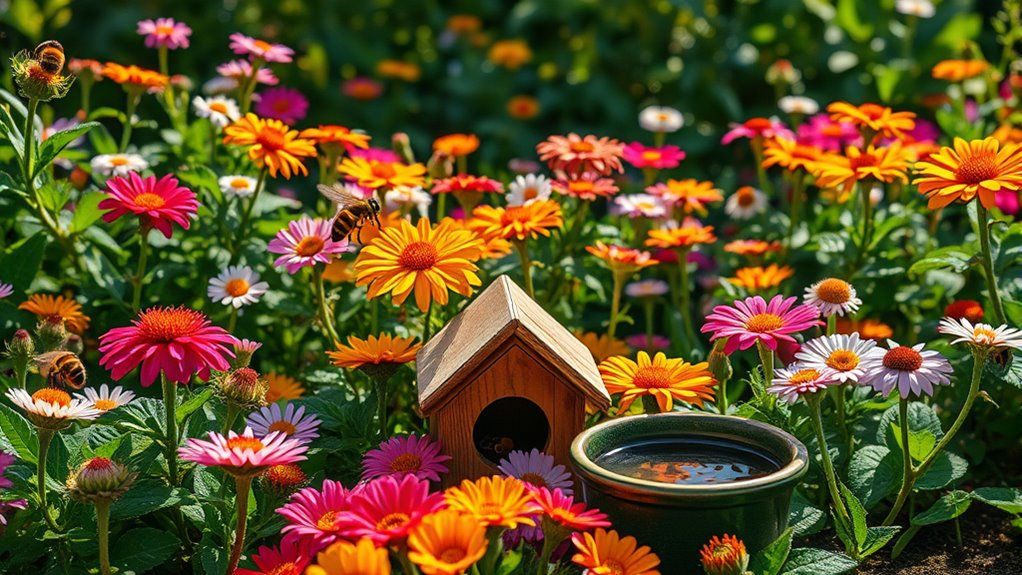
To attract beneficial insects, start by planting nectar-rich flowers that provide essential food sources. You should also create shelter options, like small habitats, to give these helpful insects a safe place to thrive. Minimizing chemical use in your garden will further encourage their presence, promoting a healthier ecosystem. Additionally, incorporating diverse plant species can enhance the habitat and attract a wider variety of beneficial insects. Maintaining a raw food diet in your garden can also support the ecosystem by promoting the presence of natural pest predators.
Plant Nectar-Rich Flowers
One of the simplest and most effective ways to attract beneficial insects to your garden is by planting nectar-rich flowers.
By incorporating flowering plants like dill, fennel, and marigolds, you’ll draw in ladybugs, lacewings, and parasitic wasps that are essential for natural pest control.
Flowers with high nectar content, such as cosmos and zinnias, not only attract pollinators but also contribute to a diverse ecosystem that supports healthier plants.
Aim to plant a variety of flowers that bloom at different times throughout the growing season to guarantee a continuous food source for these beneficial insects.
Research shows that gardens abundant in nectar-rich flowers can increase beneficial insect populations by up to 50%, leading to improved plant health and effective pest management.
Provide Shelter Options
While you focus on attracting beneficial insects, providing them with suitable shelter options is essential for their establishment and effectiveness in your garden. Creating habitats like birdhouses can draw insect-eating birds, while bat boxes offer shelter to bats, natural predators that help control pests. Incorporating diverse plant species not only attracts beneficial insects but enhances the ecosystem balance. Leaving undisturbed areas allows insects like ladybugs and lacewings to establish nesting sites, while ground cover with native plants fosters a favorable environment for predatory insects.
| Shelter Option | Benefits |
|---|---|
| Birdhouses | Attracts insect-eating birds |
| Bat Boxes | Provides shelter for bats |
| Diverse Plant Species | Attracts various beneficial insects |
| Undisturbed Areas | Establishes nesting sites |
| Ground Cover | Supports predatory insects |
Minimize Chemical Use
Minimizing chemical use in your garden not only supports the health of beneficial insects but also fosters a more sustainable ecosystem.
You can create a diverse planting scheme with flowers like dill, fennel, and marigolds to attract ladybugs and lacewings, which are natural predators that help control pests. Incorporating herbs like thyme and parsley enhances flavor while inviting pollinators and predatory insects.
Companion planting is also effective; it keeps pests at bay naturally. Additionally, installing birdhouses can attract insect-eating birds, further reducing pest populations.
Natural Remedies for Pest Control
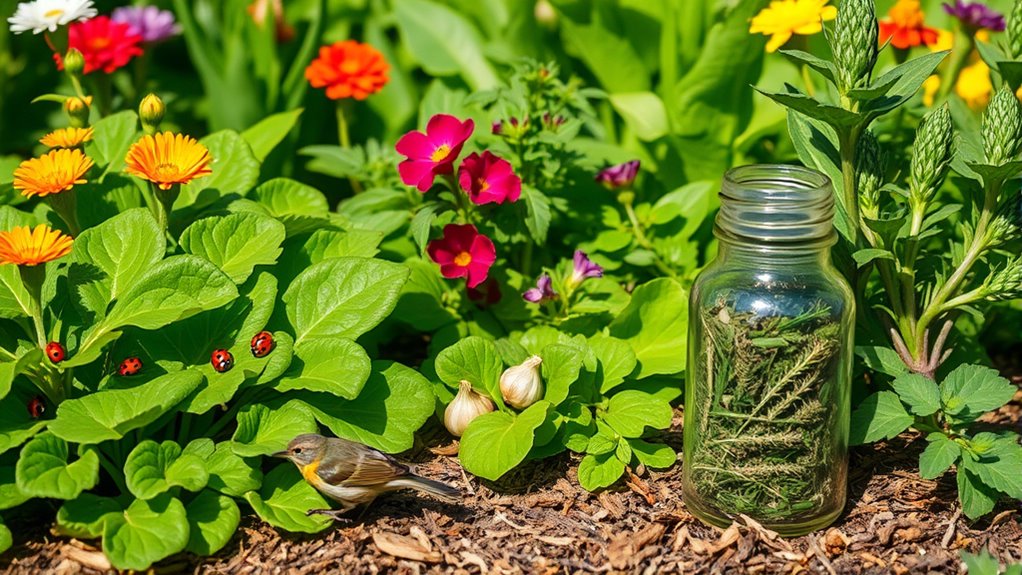
When pests invade your garden, natural remedies can provide effective solutions without harsh chemicals. Here are three organic options to keep your plants healthy and thriving:
- Soap Spray: Mix 2.5 tablespoons of dish soap and vegetable oil in a gallon of distilled water. This effective natural remedy targets pests like aphids.
- Garlic Spray: Infuse minced garlic in mineral oil, dilute with water, and spray. This potent natural insect repellent deters various pests.
- Neem Oil: Combine neem oil with water and dish soap. This versatile treatment repels pests and suppresses their appetite, making it a great choice.
Experimenting with these remedies can lead to tailored solutions for your garden’s specific pest issues!
Companion Planting Strategies
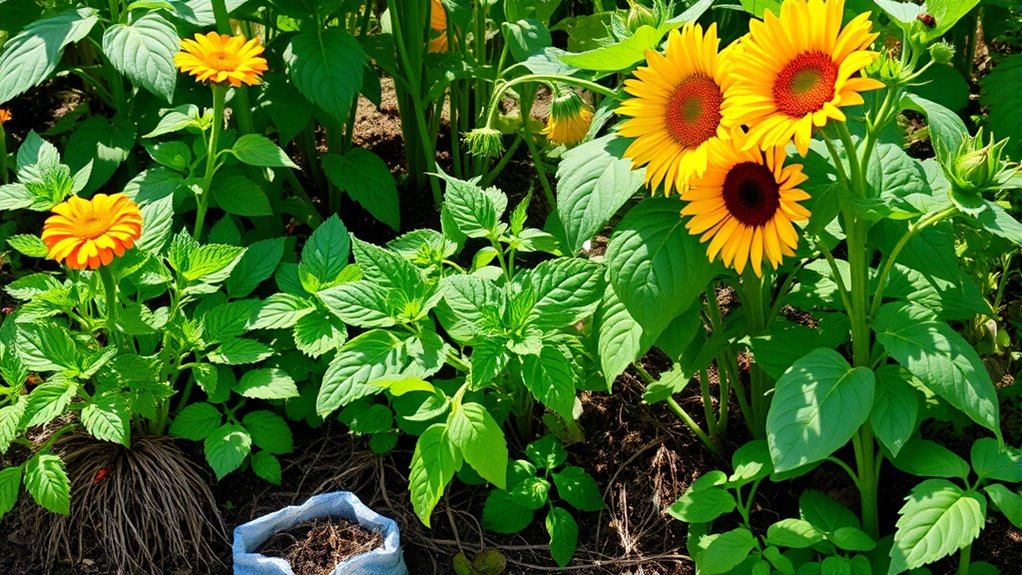
Companion planting strategies offer a natural way to enhance your garden’s health and productivity. By growing different plants together, you can repel pests and boost growth.
For instance, marigolds not only deter nematodes but also improve the well-being of your vegetable beds. Pairing herbs like basil with tomatoes enhances flavor while repelling aphids and hornworms.
Planting dill and fennel can attract beneficial insects, such as ladybugs, which provide effective pest control. A classic combo is beans and corn; beans fix nitrogen, benefiting corn, while corn supports climbing beans.
Additionally, integrating flowers like calendula attracts pollinators, promoting biodiversity and organic methods in your garden. Embrace these strategies for a thriving, pest-resistant garden!
Using Barriers and Traps
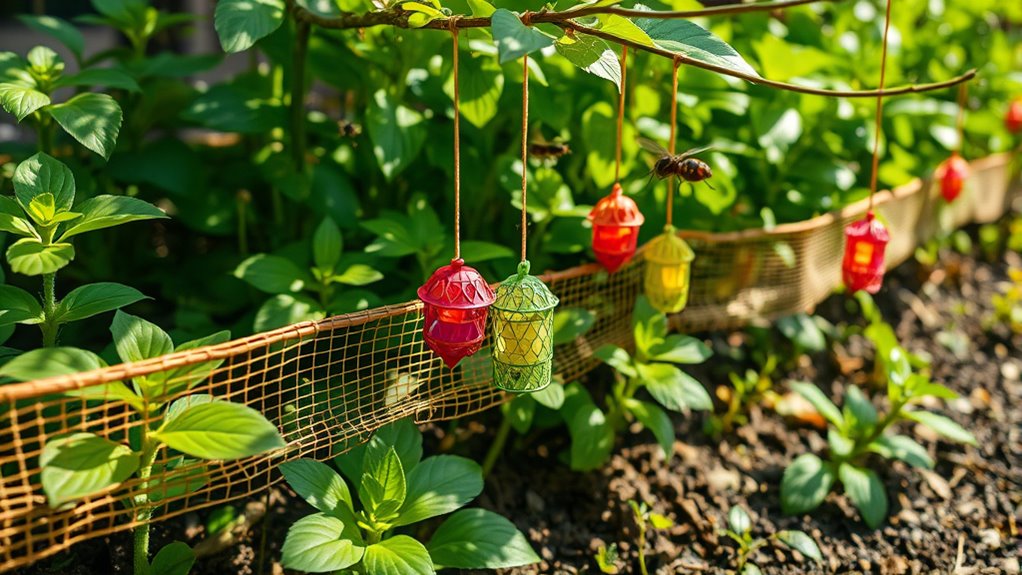
To further enhance your garden’s defenses, using barriers and traps can be an effective strategy against pests.
Enhancing your garden’s defenses with barriers and traps is a smart strategy to combat pests effectively.
Consider implementing these techniques:
- Insect mesh: This physical barrier blocks small flying insects like aphids, keeping them away from your young plants while allowing sunlight and moisture in.
- Beer traps: Bury containers filled with beer to attract and drown slugs, greatly reducing their numbers in your garden.
- Copper tape and sticky traps: Use copper tape to deter slugs and snails, while sticky traps can help monitor pest populations and trap specific pests like aphids.
Frequently Asked Questions
How Do You Control Pests in Vegetable Garden Organically?
To control pests in your vegetable garden organically, start by using physical barriers like insect mesh to shield your plants.
Handpick visible pests or spray them off with water.
Attract beneficial insects by planting flowers like marigolds and dill. You can also set up beer traps for slugs and grow mint to deter them.
Regularly monitor your plants for signs of trouble and implement an Integrated Pest Management strategy to keep everything healthy.
How Do You Make Natural Pest Control for Gardens?
To make natural pest control for your garden, you’ll want to mix simplicity with effectiveness.
Start by combining dish soap and vegetable oil in water for a powerful spray against soft-bodied insects.
Alternatively, infuse garlic in oil, creating a pungent deterrent.
Don’t forget essential oils, like peppermint, to repel pests without chemicals.
Finally, set up beer traps for slugs.
These methods work together, creating a balanced approach to keeping your garden thriving.
How Do I Get Rid of Bugs in My Vegetable Garden Naturally?
To get rid of bugs in your vegetable garden naturally, start by handpicking pests or using a strong jet of water to dislodge them.
You can also create beer traps to attract and drown slugs.
Consider using a soap spray made from dish soap and vegetable oil to target soft-bodied insects.
Additionally, plant flowers like dill and fennel to attract beneficial insects that help keep pest populations in check.
How to Get Rid of Garden Pests Without Pesticides?
You might think that getting rid of garden pests requires harsh chemicals, but that’s not true! You can effectively manage pests without pesticides by handpicking them or using a strong jet of water.
Consider setting up beer traps to lure slugs or creating physical barriers to protect your plants. Adding companion plants like marigolds can repel harmful insects, while DIY sprays made from garlic or neem oil can deter pests without harming beneficial ones.
Conclusion
By embracing natural pest control methods, you’re not just protecting your garden; you’re nurturing a vibrant ecosystem. Imagine your garden as a symphony, where each insect plays an essential note. Just like a conductor guides musicians, you can harmonize beneficial insects and plants to work together against pests. So, the next time you spot an unwanted visitor, remember, your garden’s orchestra is ready to perform its natural defense—creating a beautiful, balanced environment for all to enjoy.
